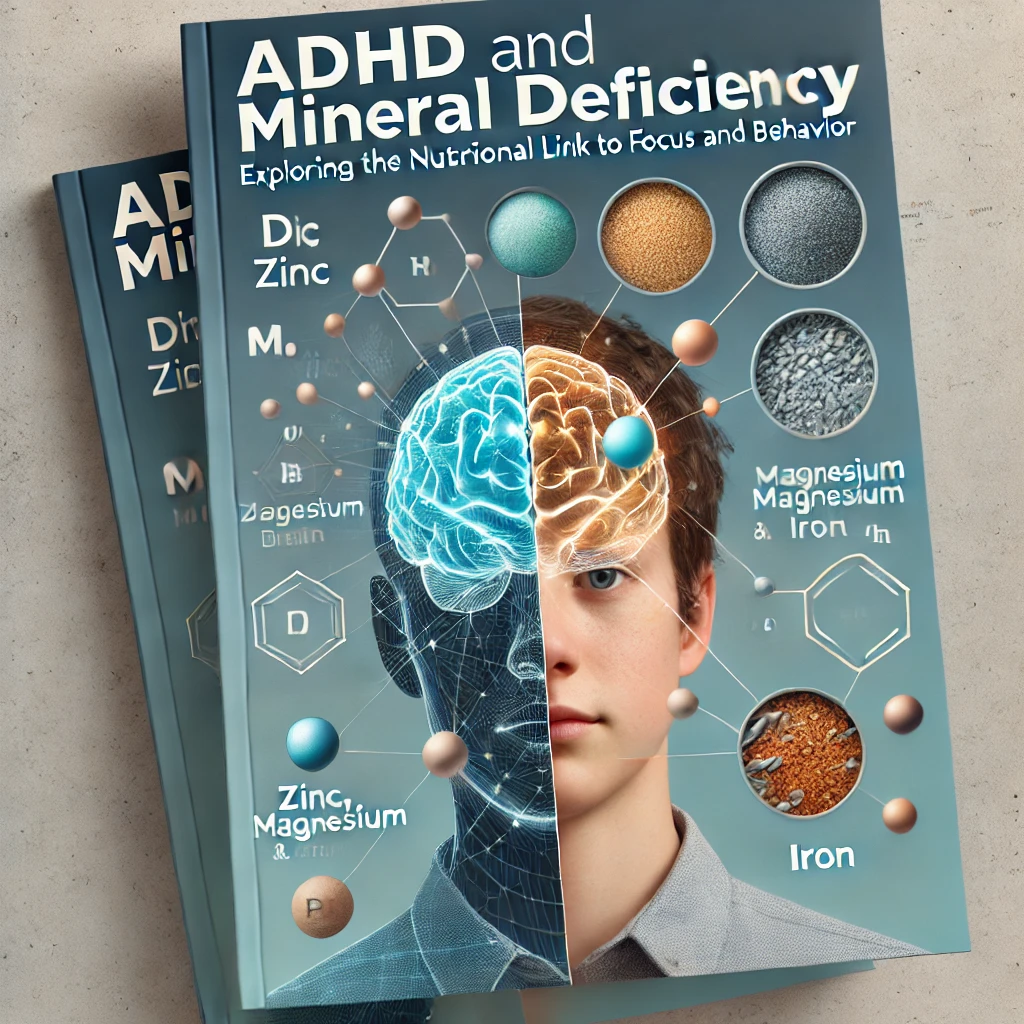The Overlooked Link Between ADHD and Mineral Deficiencies: What You Need to Know

The Overlooked Link Between ADHD and Mineral Deficiencies: What You Need to Know
Attention-Deficit/Hyperactivity Disorder (ADHD) affects millions of children and adults worldwide, leading to challenges with focus, organization, impulse control, and emotional regulation. While medications like stimulants are commonly prescribed, they don’t address the root causes or contributing factors — including nutritional deficiencies.
Emerging research and clinical experience suggest that mineral deficiencies may play a significant role in the severity of ADHD symptoms. Minerals are vital for neurotransmitter production, brain development, mood regulation, and energy metabolism — all key areas impacted in ADHD.
In this blog, we’ll explore the science behind ADHD and mineral imbalances, which minerals are most commonly deficient, and how a functional medicine approach can support better focus, mood, and cognitive performance naturally.
The Brain’s Dependence on Minerals
Minerals are micronutrients that may be small in quantity, but they’re massive in importance — especially for the brain.
Key functions of minerals related to ADHD include:
- Neurotransmitter synthesis (dopamine, serotonin, GABA)
- Methylation support for gene regulation and detox
- Modulating electrical activity in neurons
- Regulating inflammation and oxidative stress
- Supporting adrenal and thyroid function
A deficiency in any of these processes can alter brain chemistry, energy, and behavior — which is why mineral balance is crucial for managing ADHD symptoms.
Common Mineral Deficiencies Linked to ADHD
1. Magnesium
Magnesium is often referred to as “nature’s calming mineral.”
It supports:
- Dopamine regulation
- GABA production (calming neurotransmitter)
- Stress response and sleep quality
Deficiency symptoms:
- Hyperactivity
- Anxiety or restlessness
- Difficulty falling or staying asleep
- Muscle tension or cramps
Studies show that children and adults with ADHD frequently have lower magnesium levels, and supplementation may reduce hyperactivity and improve focus.
2. Zinc
Zinc is essential for:
- Dopamine production and metabolism
- Brain cell communication
- Immune system regulation
Deficiency symptoms:
- Impulsivity
- Mood swings
- Poor attention
- Frequent infections or slow wound healing
Zinc also helps regulate melatonin, which affects sleep-wake cycles and behavior. A zinc deficiency can impair the effectiveness of ADHD medications and reduce dopamine receptor sensitivity.
3. Iron
Iron is needed for:
- Dopamine synthesis (a key neurotransmitter in ADHD)
- Oxygen delivery to the brain
- Mitochondrial energy production
Deficiency symptoms:
- Fatigue
- Poor concentration
- Irritability
- Cold hands and feet
- Pale skin
Low ferritin levels (your iron storage marker) are commonly seen in individuals with ADHD — even if hemoglobin appears normal. Research shows that iron supplementation in deficient children can improve attention and reduce the need for higher medication doses.
4. Copper
Copper and zinc have a delicate balancing act — too much copper (relative to zinc) can cause:
- Overstimulation
- Anxiety or irritability
- Aggression or mood dysregulation
Excess copper can impair dopamine metabolism and increase norepinephrine, contributing to emotional outbursts or agitation. This is why testing both copper and zinc — and evaluating the copper:zinc ratio — is critical in ADHD assessment.
5. Calcium
Calcium helps regulate:
- Nerve signaling
- Muscle contraction
- Mood and neurotransmitter release
Low calcium, often secondary to magnesium deficiency or gut absorption issues, can contribute to:
- Nervousness
- Difficulty concentrating
- Physical restlessness
While calcium is less commonly targeted alone, it plays a synergistic role with magnesium, and both need to be in balance.
Why Are Mineral Deficiencies So Common in ADHD?
Several factors contribute:
- Poor dietary habits (low intake of whole foods, excess processed snacks)
- Selective eating in children with sensory sensitivity
- Digestive issues (like leaky gut or low stomach acid) impair absorption
- High stress depletes magnesium and zinc
- Environmental toxin exposure (like heavy metals) increases nutrient demands
- Genetic mutations (like MTHFR) can impair methylation and mineral utilization
Even with a “normal” diet, many individuals with ADHD may still not be absorbing or using nutrients effectively.
The Gut-Brain-Mineral Connection
Your gut plays a central role in nutrient absorption — and gut dysfunction is common in ADHD.
Signs of poor gut health include:
- Bloating or constipation
- Food sensitivities
- Histamine intolerance
- Frequent antibiotic use
- Eczema or immune issues
When the gut is inflamed or “leaky,” the ability to absorb minerals — especially zinc, magnesium, and iron — is compromised. This creates a vicious cycle where mineral deficiencies worsen brain function and behavior, and poor behavior further increases stress and inflammation.
Functional Medicine Testing and Solutions
At Sheen Vein and Cosmetics, we take a comprehensive functional medicine approach to ADHD, looking beyond just symptoms.
Our ADHD Evaluation Includes:
- Micronutrient testing (zinc, magnesium, iron, copper)
- Hair tissue mineral analysis (HTMA) for long-term mineral trends
- Stool testing for gut inflammation and absorption
- Organic acids testing for mitochondrial and neurotransmitter markers
- Genetic testing (e.g., MTHFR) for nutrient processing
Treatment Plans May Include:
- Personalized mineral supplementation (bioavailable forms like magnesium glycinate, zinc picolinate, iron bisglycinate)
- Gut repair protocols
- Clean, high-nutrient diet support
- Neuroinflammation and mitochondrial support (e.g., omega-3s, NAC, phosphatidylserine)
When mineral imbalances are corrected, many clients experience:
- Improved attention span
- Calmer mood and behavior
- Better sleep
- Enhanced response to medication or reduced need for it
Don’t Overlook the Basics
ADHD is a complex, multifactorial condition — but before reaching for higher doses of medication, it’s worth asking:
“Is the brain missing the building blocks it needs to function?”
Mineral testing and nutritional support are often low-risk, high-reward strategies that lay the foundation for better cognitive performance, emotional regulation, and overall well-being.
Call to Action:
Do you or your child struggle with focus, energy, or mood swings? Mineral deficiencies may be the missing link. Contact Sheen Vein and Cosmetics for a personalized functional medicine evaluation and start supporting brain health from the inside out.